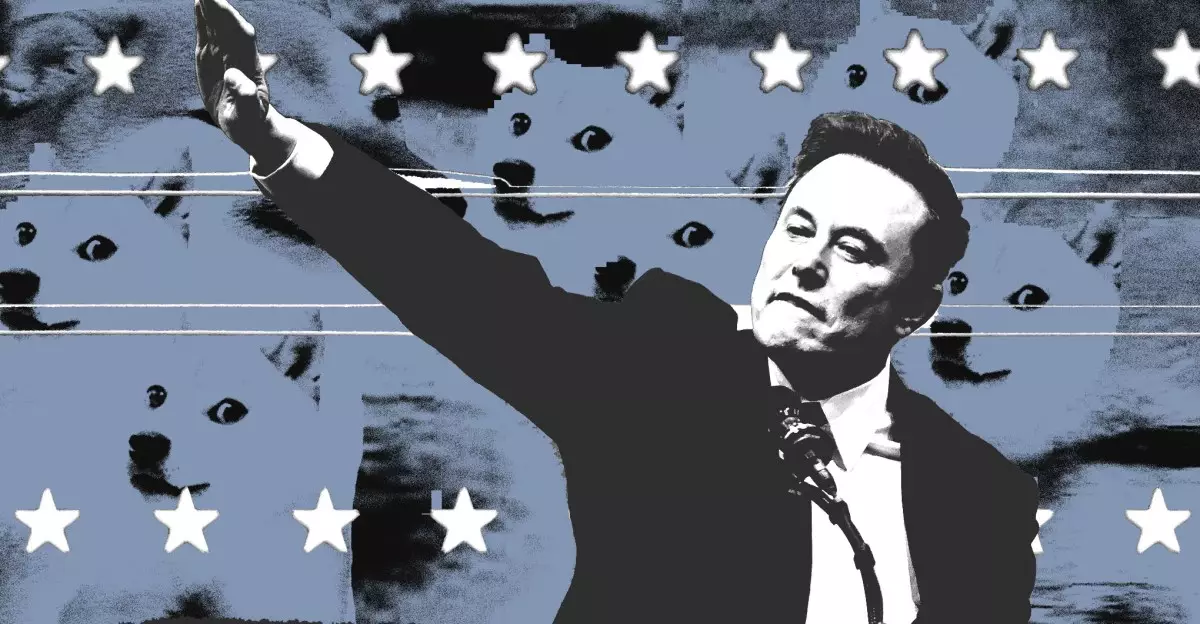The political arena is often rife with extremities, particularly within the fringes of conservatism, where ideas can traverse the line between mainstream thought and extremist ideology. Recent developments surrounding Marko Elez, a young staff member within the Department of Government Efficiency (DOGE), highlight this troubling trend. Elez, who was ensconced in a position that allowed him access to federal financial systems, became embroiled in controversy after an old social media account tied to him was uncovered. This account was not simply benign; it contained alarming posts advocating for eugenic immigration policies and the repeal of the Civil Rights Act. The visibility brought to Elez’s views illustrates a broader movement amongst certain sectors of young conservatives who seem increasingly comfortable voicing extremist ideologies.
Statements made on Elez’s now-defunct social media account, such as claims that “99% of Indian H1Bs will be replaced by slightly smarter LLMs,” echo a peculiar blend of technological determinism and anti-immigrant sentiment. The invocation of LinkedIn’s H-1B visa discussions only highlights how these narratives are strategically placed to resonate within tech circles while promoting discriminatory policies. Such rhetoric is not merely casual banter; it sets a dangerous precedent that connects technology, economics, and immigration policy through a lens of exclusion. This is concerning, especially coming from someone in a position of governmental power, underscoring the potential for harmful ideologies to permeate policy-making.
Elez’s resignation underscores not just an isolated incident of problematic behavior but points to a concerning paradigm within the dog-eat-dog landscape of contemporary conservative politics. Historically, resignations and dismissals of individuals affiliated with extremist views have surfaced throughout various administrations, yet the current climate suggests a normalization of such beliefs. By hosting individuals like Darren Beattie, a previously ousted Trump speechwriter who has openly mocked diversity initiatives, the administration appears to embody a selective memory—choosing to ignore past grievances in the pursuit of a shared agenda.
The focus on dismantling diversity, equity, and inclusion (DEI) efforts is gaining traction in government under the auspices of efficiency and effectiveness. Positions held by staff such as Elez and Beattie exhibit a willingness to undermine civil rights frameworks, all under the guise of rooting out perceived inefficiencies. This approach raises an unsettling question: are we witnessing a conscious effort to reshape governmental norms to reflect a more homogenous and exclusionary set of values?
The phenomenon surrounding young conservatives’ affinity for extreme views cannot be understood in isolation. The term “groyperfication,” as coined by writer John Ganz, points to a shift in how young conservative staffers engage with radical ideas proliferated in online communities. These platforms often serve as echo chambers, fostering an alarming culture steeped in white supremacy, eugenics, and conspiratorial thinking surrounding notions like the Great Replacement.
This cultural milieu creates fertile ground for radicalization, as aspiring young conservatives adopt increasingly belligerent rhetoric to distinguish themselves within their political youth culture. It is a cycle that not only legitimizes harmful ideologies but also transforms them into acceptable discourse within certain factions of conservative governance. The troubling pattern implies that educational institutions and workplaces could be swathed in an atmosphere that favors exclusionary ideologies over more progressive values.
As political dynamics continue to evolve, the emergence of ideologies espoused by individuals like Marko Elez emphasizes the need for continued scrutiny. While many may view such developments as extreme outliers, the increasing acceptance of these views within young conservative circles warrants vigilance and, ideally, counteraction. It is paramount that both policymakers and citizens remain acutely aware of the conversations taking place not only in halls of power but also in the digital spaces where these dangerous ideologies are propagated. Fostering a political environment that promotes inclusivity and respects civil rights is imperative, lest we inadvertently permit the normalization of exclusionary practices that threaten the very fabric of a diverse democracy.

